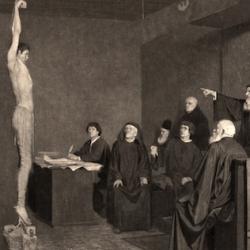John Gray’s TNR review of Richard Dawkins’s An Appetite for Wonder is the very definition of withering. It should be read in full. As a public service, a few of the juicier quotations:
“No two minds could be less alike than those of the great nineteenth-century scientist [i.e., Darwin] and the latter-day evangelist for atheism. Hesitant, doubtful, and often painfully perplexed, Darwin understood science as an empirical investigation in which truth is never self-evident and theories are always provisional. If science, for Darwin, was a method of inquiry that enabled him to edge tentatively and humbly toward the truth, for Dawkins, science is an unquestioned view of the world.”
This is breathtaking in its condescension: “Listening to Elvis sing ‘I Believe,’ Dawkins was amazed to discover that the rock star was religious. ‘I worshipped Elvis,’ he recalls, ‘and I was a strong believer in a non-denominational creator god.’ Dawkins confesses to being puzzled as to why he should have been so surprised that Elvis was religious: ‘He came from an uneducated working-class family in the American South. How could he not have been religious?’”
This on Dawkins the evangelical: “If there is anything remarkable in his adolescent rebellion, it is that he has remained stuck in it. At no point has Dawkins thrown off his Christian inheritance. Instead, emptying the faith he was taught of its transcendental content, he became a neo-Christian evangelist. A more inquiring mind would have noticed at some point that religion comes in a great many varieties, with belief in a creator god figuring in only a few of the world’s faiths and most having no interest in proselytizing. It is only against the background of a certain kind of monotheism that Dawkins’s evangelical atheism makes any sense.”
On the incoherence of Darwinian explanations of religion: “A meme-based Darwinian account of religion is at odds with Dawkins’s assault on religion as a type of intellectual error. If Darwinian evolution applies to religion, then religion must have some evolutionary value. But in that case there is a tension between naturalism (the study of humans and other animals as organisms in the natural world) and the rationalist belief that the human mind can rid itself of error and illusion through a process of critical reasoning.” Dawkins sees only half of this: If there’s a God gene, religion is illusion. Darwinianism demands the second half that Dawkins doesn’t acknowledge: If there’s a God gene, it must be conducive to survival.
And this in conclusion: “It is hard to resist the thought that the public recognition that in Britain is conferred by a knighthood is Dawkins’s secret dream. A life peerage would be even better. What could be more fitting for this tireless evangelist than to become the country’s officially appointed atheist, seated alongside the bishops in the House of Lords? He may lack their redeeming tolerance and display none of their sense of humor, but there cannot be any reasonable doubt that he belongs in the same profession.”











